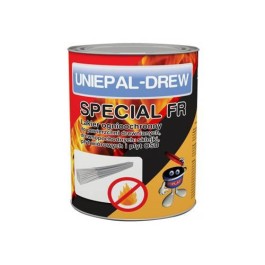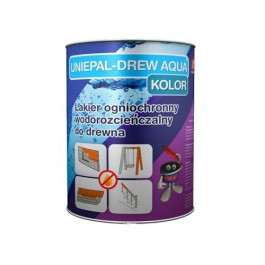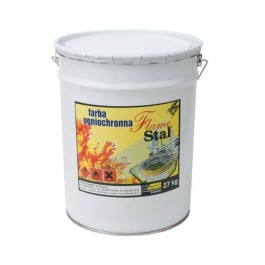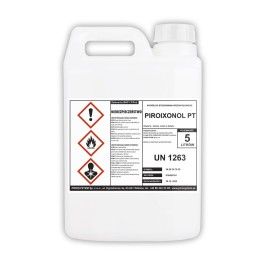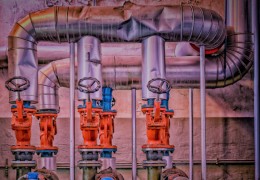Varnish for fire-retardant and decorative surface protection.
- Wroclaw,
- Katowice,
- Warsaw,
- Gdańsk,
- Poznań
- +48 717 026 346
Fire protection
Fire retardant paint
Protecting steel structures with fireproof paints has become a standard in construction. These paints are also called intumescent paints because during a fire the coating increases in volume by up to 50 times. By producing protective foam, they delay the heating of elements and, consequently, reaching the critical temperature of the steel. Thanks to this, the steel structure is effectively protected and people have time to evacuate.
Call - we will help in choosing fireproof paints: +48 717 026 346
To learn more about selecting a fire protection system and browse products, go to the " Steel structures " subcategory.
Our offer includes:
All fire-resistant paints we offer have current ITB or ETA approvals and other documents necessary for use in construction. We help in selecting a fire protection system and perform calculations for the client. We provide training and a Contractor's Certificate.
Fire retardant varnishes for wood
Fire retardant varnishes from the Uniepal-Drew line are used to provide fire protection to wooden surfaces, giving them an aesthetic finish. Of course, the most important are their properties, thanks to which the wood obtains the appropriate fire classification - Euroclass. According to the Polish standard PN-EN 13501-1, there are 7 basic classes for construction products, which are marked with the letters: A1, A2, B, C, D, E, F, while for floors the classes are marked A1fl, A2fl, Bfl, Cfl, Dfl, Efl, Ffl. As you can easily guess, A means the best class and F means the worst class. In addition, two additional classes are marked: si d. The symbol s (for smoke) indicates how much smoke the material produces during a fire, and the symbol d (for droplets) informs about the formation of burning drops that may contribute to the spread fire. The combination of these symbols gives us the Euroclass, e.g. B-s1,d0. To learn more about the meaning of these symbols and to browse products, go to the “ Wood ” subcategory.
We offer three fire retardant varnishes:
Uniepal-Drew Special FR - solvent-based fire-retardant varnish, for interior and exterior applications
Uniepal-Drew Aqua Kolor - water-based fire-retardant varnish, for interior applications, recommended, among others,
for protecting roof trusses Uniepal-Drew Aqua 1-K - water-soluble fire-retardant varnish, for use on floors, furniture, stairs, handrails and other elements requiring higher mechanical resistance
All products we offer have current ITB approvals and other documents necessary for use in construction.
Help in choosing fire -resistant coatings, call: +48 717 026 346
Product offer
Fire retardant wood varnish in many colors. For indoor and outdoor use.
Intumescent fire-retardant paint for indoor and outdoor use. Easy to apply and quick-drying.
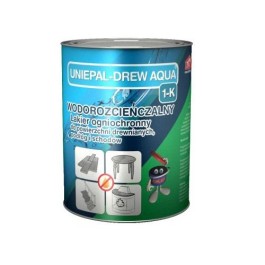
- NOTE: WATER-BASED PRODUCT. Choose temperature-controlled shipping to receive the product on the declared date, regardless of the weather. Standard shipments may be held due to temperatures below 5°C along the delivery route.
Colorless wood varnish for protecting and finishing wooden surfaces. Fire retardant product with high hardness and resistance.
Can swelling paints be painted over oil paint?
keyboard_arrow_down keyboard_arrow_upEach intumescent paint has appropriate documents, including the European Technical Assessment or ITB Technical Approval. This is a document containing all information about primers and topcoats that can be used with a given intumescent paint. These coatings are checked in tests and approved by the manufacturer of the fire-retardant paint for the painting set. Typically, specific product names and types are provided (e.g. anti-corrosion epoxy primer) or it is written according to which standard a given paint must be produced in order to be a primer for intumescent paint. For example, the following primer paints can be used up to the C3 corrosion class for the Flame Stal fire-retardant paint: - solvent-based epoxy anti-corrosion primer - alkyd primer paints meeting the requirements of PN-C-81901:2002 (this information should be included in the product's technical data sheet) In the case of paint Fire retardant Steelguard 651 we no longer have so much freedom and a primer should be used from the specific products listed in the European Technical Assessment. Another example is Nullifire SC803 paint, where we can choose from: - two-component solvent-based epoxy primers - solvent-based alkyd primers - water-based acrylic primers To sum up, fire retardant paint cannot be applied over any primer paint. If there is already some paint on the structure and we do not know exactly what kind of coating it is, unfortunately it should be removed. The use of primer paint that does not comply with the documentation may result in acceptance problems or the entire painting system becoming detached during a fire.
Fire protection painting of steel structures - how many layers?
keyboard_arrow_down keyboard_arrow_upThere is no clear answer to this question. The thickness of the coating, and therefore the amount of layer, of fire retardant paint depends on three factors. The first one is the indicator of the massiveness of the steel profile cross-section. This indicator is different for different steel profiles, for example for the IPE240 I-section it is 236 [1/m] and for the UPN300 U-section it is 162 [1/m] (in the case of profiles exposed to fire on four sides). The second factor is the critical temperature, which should be determined by the designer. The critical temperature may be, for example, 550ºC, but may also be 650ºC. For each of these values, the coating thickness for the same steel profile will be different. The third factor is the required fire resistance class. The classes are marked R15, R30, R60, R120. The number indicates the time in minutes - how long the fire-retardant coating delays the structure reaching a critical temperature during a fire. In other words, it can extend the time to evacuate people or conduct firefighting operations. The higher the fire resistance class, the greater the thickness of the intumescent paint coating. For example, for the previously mentioned IPE240 I-beam, the critical temperature is 550ºC, assuming that it is a column: - for class R15 - 0.226 mm dry with Nullifire SC803 paints - for class R60 - 0.684 mm dry with Nullifire SC803 paints
How to choose fire retardant paint?
keyboard_arrow_down keyboard_arrow_upWe select fireproof paint depending on the profiles that make up the steel structure and the required class of fire protection. We always choose the paint optimally for a specific case, so as to obtain the thinnest possible coatings and, consequently, a lower price of the material per square meter. Some paints work better on open profiles (e.g. I-beams), while they are unfavorable for closed profiles (e.g. square pipes).
Intumescent paint thickness - what is recommended?
keyboard_arrow_down keyboard_arrow_upThere is no general recommended film thickness for fire retardant paint. The thickness of the fireproof paint is selected based on the required protection class (R15, R30, R60...), the critical temperature and the massiveness index of the steel profile cross-section. On this basis, the thickness of the intumescent paint coating is selected from the tables in the European Technical Assessment issued for a given product.
How to paint with intumescent paint?
keyboard_arrow_down keyboard_arrow_upThe recommended method of applying fire retardant paint is airless spraying. It is not always possible to use spraying, sometimes we also have to paint several beam feet protruding from the ceiling and in such a case spraying will not be economical. In such cases, we can apply swelling paints by hand, but they are quite thick and when painted by hand (roller, brush) the structure will remain (orange peel after the roller, gray after the brush). You should also remember that when applying with a brush in one layer, we will not apply a coating thicker than 150-250 microns dry. For higher protection classes, the required dry coating thickness may be up to 1,500 or 4,000 microns. It is easy to calculate that this means the need to apply, for example, 10 layers with a brush, while spraying can apply up to 800 microns at one time.
Proven products
Here you will find products with high strength and technical parameters. Thanks to this, you can enjoy long-lasting effects.

Help in choosing
Are you wondering which products will be best for your needs? Call us - we will advise you and choose the right solution.

Contractor support
Do you need help with construction work? Let us know and we will recommend proven contractors.
Stationary points
Do you want to collect the products in person? Or maybe you prefer to talk live? Visit our branch in: Warsaw, Wrocław, Katowice or Gdańsk.



